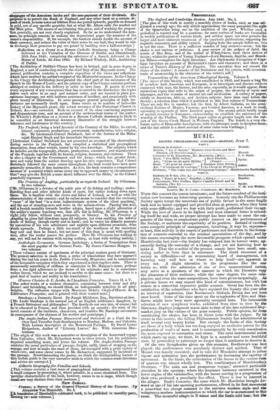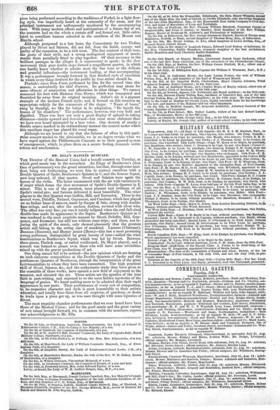MUSIC.
EIGHTH PHILHARMONIC CONCERT—MONDAT, JULY 7.
PART I.
Sinfonla In G minor Mozart. Doak., "La ci darem," Madame Gras Dorus and Herr
Pischek, (II Don Giovanni') Mozart. Concerto In D. Pianoforte, Mr. Moscheles, (MS.) J. S. Bach. Emit. " Der Hillis Seibst," j Herr PIschek, }Spohr. Axle, "Liebe ist die zurte Bilithe," (feast,)
Fault. " Ah pour on Jenne," j Madame Gras Dorm), t Aube, Air, "0 tourment du veuvage," i(Le Cheval de Bronze,) j
Overture, "The Calm Sea and Prosperous Voyage," .Mendeissolm BarthOW.
PAST
Sinfonia in B fiat, (No. 4,) Beethoven.
Aria, "Nasce at bosco," Standigh (zEtiar,) Handel. Concertante, Two Violins, Signor Camillo Sivorl and M Salmon, (No. 2,) - Spokr.
Overture, Jubilee C. IL. mon Weber, Leader, Kr. T. Cooke—Conductor, Mr. Moscheles.
WITH this concert the season terminates, and the future conduct of the insti- tution now be,comes an interesting question. Scarcely can the Philharmonic
Society again tempt the uncertain sea of public favour in the same fragile bark and no better equipped and provided than at present, when-they have with some difficulty, and we fear with little profit, performed their voyage. While the love of music in its highest and most classical forms is extend- ing itself far and wide, no proper attempt has been made to meet the exi- gencies of the time, to concentrate public interest on the performances of the Society, or maintain the superiority of its position. Instead of exerting some energetic principle of management, involving, it may be, =penile-- at least, that activity in the search of performers and discretion in the forma- tion of concerts essential to the musical speculations of the day, and by this means encouraging the more favourable prospects which opened under Mendelssohn last year—the Society has relapsed into its former state; ap- parently feeling the necessity of a change, and yet not knowing how (to make it. Thus the wmelties of the present season have been small, con- sisting rather in form than in substance. The timid resources of society in difficulties—of an economizing board of management, not knowing very well how or where to help itself—are apparent in every act. A slight alteration in the programme like the one before us, with the admission of one or two unaccustomed naniet, may serve as a specimen of the manner in which the Directors vary the pleasures of their audience; while the same singers, the same solo- players, and even the same compositions have been given unsparingly. At a private house we may expect this kind of entertainment, but with lent reason at a somewhat expensive public concert. Great has been the dis- satisfaction of the subscribers who have rejoined the Society this year after an interval of separation, that Beethoven's Sinfonia. &vice has not been once heard. Some of the time spent on the symphonies of Ries and Mac- fruren might have been more agreeably occupied hare. The lamentable selection of new symphony works, exhibited from time to time by the Directors, displays judgment much akin to that of the late celebrated _Hay- market jury on the virtues of the prize comedy. Public opinion, far frcan sanctioning the choice, has been at direct issue with the judges. By its errors in this matter, the falling Philharmonic Society has administered to itself several very hearty kicks. But enough: the faults tif this Society are those of a body which has too long enjoyed an exclusive patent for the production of worl-s of taste, and is consequently -by-its very constitution the more exposed to corruption and abuse. The next instrumental 'mice which starts up may, we trust, be kept -in a sounder and more healthful state, by pretending to patronage no longer than it continues to deserve it.
Of the two Symphonies given on this occasion, Beethoven's was best played: the performance was pectillArly distinct and spirited. That Of Mozart was tamely executed; and in vain did Moscheles attempt to infuse vigour and animation into the -performance by increasing the rapidity of movement. In the finale, the articulation of the basses in the various runs of quavers was almost -wholly lost. The combinations of Mendelssohn's Overture, "The calm -sea and prosperous voyage," attracted particular attention in the opening; where the dominant harmony sustained mu the lower region of the violoncellos, with the basses moving in a progression of their own, produced a peculiarly fine effect. There is less to interest in the allegro. Bach's Concerto, the same which Mr. Moscheles brought for- ward at one of his late morning performances, offered in its first mor.rement a somewhat too abrupt contrast to the extreme modern style aud the voluptuous modern instrumentation to which the ear is accustomed in this room. The mournful adagio in B minor and the finale told beat: but this
piece being performed according to the traditions of Forkel, in a light flow- ing style, was imperfectly heard at the extremity of the room, and the • principal instrument not unfrequently smothered by the accompanying ones. With many modern effects and anticipations of a future day of art, the concerto had on the whole a certain stiff and formal cut, little calcu- lated to conciliate hearers schooled in the cantilena of the Mozart and Haydn school.
Although postponed to a late hour, the Concertante for two Violins, played by Sivori and Sainton, did not fail, from the finish, energy, and purity of the execution, to be a rich treat. The fine contrast of their tone, the gusto of their style, and a strong undisguised enjoyment of music, render them peculiarly fitted to play together. Of their accuracy in the brilliant passages in the allegro it is unnecessary to speak: in the slow movement their pure double stops formed a magnificent quartet, in which One hardly knew whether to admire most the fine tone or the delicate end graceful inflections-the instrument leading, or that accompanying. It was a performance brought forward in that finished style of execution in which every thing destined for the public by true artists should be. Pischek's scena from Faust, performed by him for the second time this season, is undoubtedly his chef d'ceuvre. Its perfection may atone for some offences of mannerism and affectation in other things. We cannot commend his duet with Madame Gras Dorus; which was transposed and flourished far away from its original meaning. Auber's air is a piquant example of the modern French style; and it formed on this occasion an appropriate vehicle for the ornaments of the singer. "Name al bosco," sung by Staudigl, we like far better in its adaptation, "He layeth the beams of his chambers." The performance, however, was very bold and _dignified. There was here not only a great display of aplomb in taking distances-tenths upward and downward-but some more elaborate than we have ever heard attempted by a bass voice. One descent of nearly a double octave marked in an extraordinary manner the control under which this excellent singer has placed his vocal organ.
Although we are bound to say that the balance of effect in this parti- Miler concert tended to the pleasurable, we in no degree revoke what we have urged against the Philharmonic Concerts as to their general system of management; which, to place them on a secure footing, demands entire reform and amelioration.



























 Previous page
Previous page